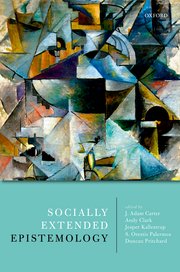Brad Wray publishes "How Far Can Extended Knowledge Be Extended? The Asymmetry Between Research Teams and Artifacts"
Socially Extended Epistemology (Oxford University Press, 2018), p. 11-23, edited by J. Adam Carter, Andy Clark, Jesper Kallestrup, S. Orestis Palermos, and Duncan Pritchard

Abstract
Duncan Pritchard (2010) has developed a theory of extended knowledge based on the notion of extended cognition initially developed by Clark and Chalmers (1998). Pritchard’s account gives a central role to the notion of creditability, which requires the following two conditions to be met: (i) beliefs must be attributable to the cognitive ability of the agent; and (ii) the agent must take responsibility for her beliefs. This chapter argues that difficulties arise when this notion of creditability is applied to situations where one’s cognition is extended by a second knowing agent rather than by an artifact, like a notebook or telescope. The chapter illustrates this by applying Pritchard’s account of extended knowledge to collaborating scientists. The beliefs acquired through collaborative research cannot satisfy both of Pritchard’s conditions of creditability. Further, there is evidence that scientists are not prepared to take responsibility for the actions of the scientists with whom they collaborate.
